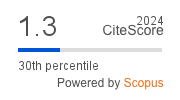Malocclusion with posterior unilateral crossbite affects superficial masseter and anterior temporal muscle activity during mastication
Downloads
Background: Mastication patterns due to malocclusion with unilateral posterior crossbite may permanently change. Purpose: This study aimed to examine the effect of malocclusion with unilateral posterior crossbite of the superficial masseter and anterior temporal muscles on the crossbite and non-crossbite sides during mastication. Methods: Thirty subjects (8 males and 22 females) between the ages of 17 and 30 years who were students of the 2017–2019 Dentistry and Dental Hygiene Study Program, Faculty of Dentistry, UGM and who had at least two posterior teeth with unilateral posterior crossbite were divided into 10 subjects with Angle's class I, 10 subjects with class II and 10 subjects with class III malocclusions. The amplitude of the superficial masseter and temporal anterior muscles was performed during mastication using surface electromyography (sEMG). The mean difference between the groups of malocclusion on the crossbite and non-crossbite sides of the superficial masseter and temporal anterior was analysed by a two-way analysis of variance (ANOVA). Results: The results indicated a difference in amplitude mean between the malocclusion types on the crossbite sides and non-crossbite sides of the superficial masseter and temporal anterior muscles (p<0.05). This study confirmed there was a decrease in superficial masseter and anterior temporal muscle activity on the crossbite side rather than in the non-crossbite side in Angle's class I and class II. However, there was an increase in activity of the superficial masseter and anterior temporal muscles on the crossbite side for class III. Conclusion: Malocclusion with unilateral posterior crossbite affects masticatory activity of the superficial masseter and temporal anterior muscles on the crossbite side.
Downloads
Premkumar S. Textbook of orthodontics. New Delhi: Elsevier; 2015. p. 89, 102–9.
Zamanlu M, Khamnei S, Salarilak S, Oskoee SS, Shakouri SK, Houshyar Y, Salekzamani Y. Chewing side preference in first and all mastication cycles for hard and soft morsels. Int J Clin Exp Med. 2012; 5(4): 326–31.
Nishi SE, Basri R, Alam MK, Komatsu S, Komori A, Sugita Y, Maeda H. Evaluation of masticatory muscles function in different malocclusion cases using surface electromyography. J Hard Tissue Biol. 2017; 26(1): 23–8.
Iodice G, Danzi G, Cimino R, Paduano S, Michelotti A. Association between posterior crossbite, skeletal, and muscle asymmetry: a systematic review. Eur J Orthod. 2016; 38(6): 638–51.
Sultana N, Hassan GS, Jha D, Nashrin T, Nahar L, Naim MA. Prevalence of cross bite among the orthodontic patients in Bangabandhu Sheikh Mujib Medical University. Bangladesh J Med. 2015; 26(1): 9–12.
de Sousa RV, Ribeiro GLA, Firmino RT, Martins CC, Granville-Garcia AF, Paiva SM. Prevalence and associated factors for the development of anterior open bite and posterior crossbite in the primary dentition. Braz Dent J. 2014; 25(4): 336–42.
Mitchell L. An introduction to orthodontics. 4th ed. Oxford: Oxford University Press; 2013. p. 11, 34–5, 44.
Alam MK. A to Z orthodontics: Retention and relapse. Kota Bharu: PPSP Publication; 2012. p. 14.
Nishi SE, Basri R, Alam MK. Uses of electromyography in dentistry: An overview with meta-analysis. Eur J Dent. 2016; 10(3): 419–25.
Woźniak K, PiÄ…tkowska D, Lipski M, Mehr K. Surface electromyography in orthodontics - a literature review. Med Sci Monit. 2013; 19: 416–23.
Fox SI. Human physiology. 14th ed. New York: McGraw-Hill Education; 2015. p. 360–76.
Okeson JP. Management of temporomandibular disorders and occlusion. 7th ed. St. Louis: Elsevier Mosby; 2012. p. 234–7.
Sandhu SS, Utreja A, Prabhakar S, Sandhu N, Kashyap R. A study of electromyographic activity of masseter and temporalis muscles and maximum bite force in patients with various malocclusions. Singh G, editor. J Indian Orthod Soc. 2013; 47(2): 53–61.
Merletti R, Farina D. Surface electromyography: physiology, engineering, and applications. Canada: Wiley-IEEE Press; 2016. p. 54–8; 89, 100–23.
Tomonari H, Seong C, Kwon S, Miyawaki S. Electromyographic activity of superficial masseter and anterior temporal muscles during unilateral mastication of artificial test foods with different textures in healthy subjects. Clin Oral Investig. 2019; 23(9): 3445–55.
Lapatki BG, Mager AS, Schulte-Moenting J, Jonas IE. The importance of the level of the lip line and resting lip pressure in Class II, Division 2 malocclusion. J Dent Res. 2002; 81(5): 323–8.
Michelotti A, Rongo R, Valentino R, D'Antò V, Bucci R, Danzi G, Cioffi I. Evaluation of masticatory muscle activity in patients with unilateral posterior crossbite before and after rapid maxillary expansion. Eur J Orthod. 2019; 41(1): 46–53.
- Every manuscript submitted to must observe the policy and terms set by the Dental Journal (Majalah Kedokteran Gigi).
- Publication rights to manuscript content published by the Dental Journal (Majalah Kedokteran Gigi) is owned by the journal with the consent and approval of the author(s) concerned.
- Full texts of electronically published manuscripts can be accessed free of charge and used according to the license shown below.
- The Dental Journal (Majalah Kedokteran Gigi) is licensed under a Creative Commons Attribution-ShareAlike 4.0 International License

















